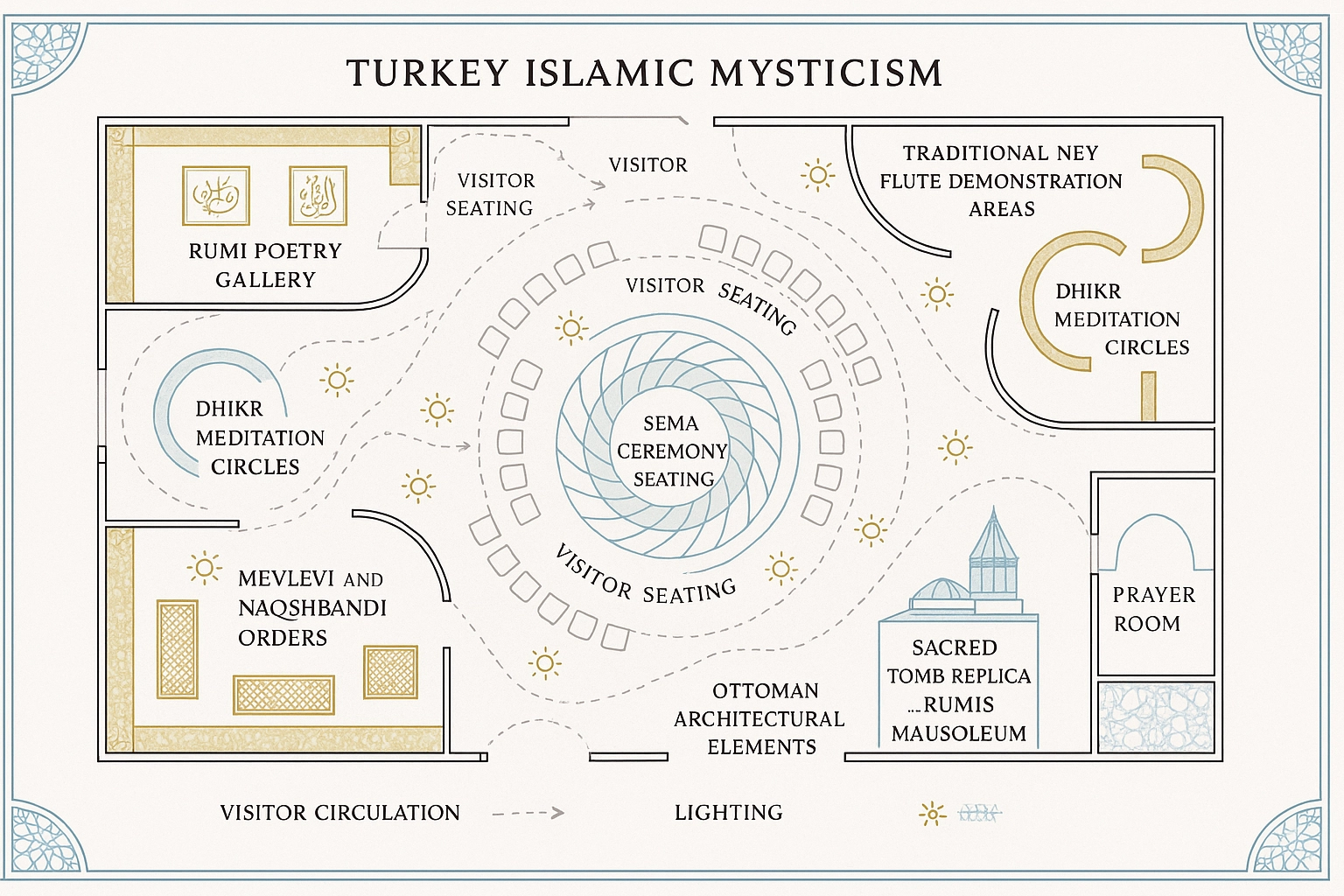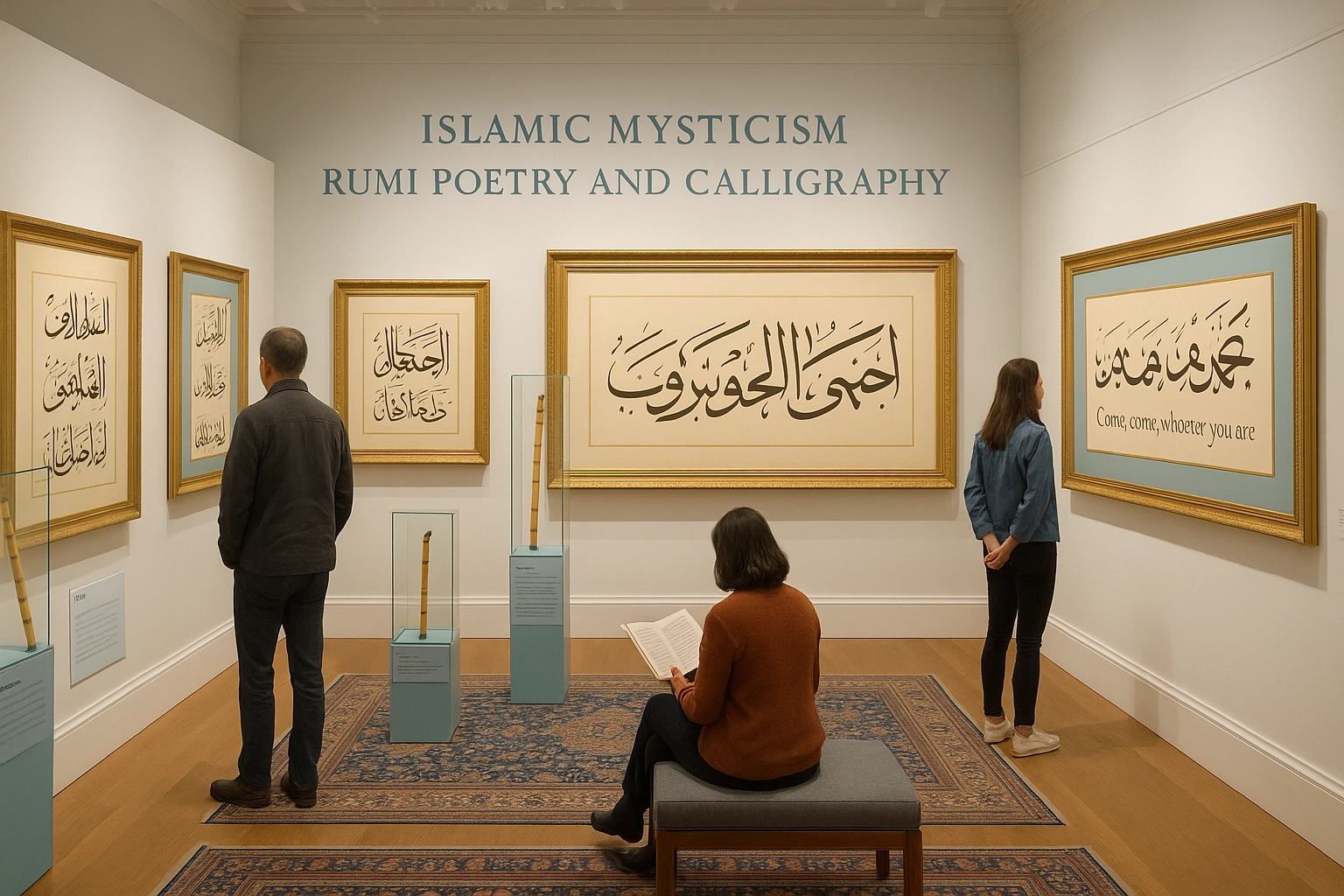Turkish Islamic Mysticism (Sufism) Exhibition
Discover the mystical path of divine love and spiritual transformation through Turkish Sufism and the legacy of Rumi
Exhibition Layout & Experience

Exhibition Floor Plan
Interactive layout showing Sema ceremony space, meditation areas, and Rumi poetry hall

Main Exhibition Hall
Featuring whirling dervish display, mystical calligraphy, and sacred music experiences

Sacred Sema Circle
Traditional circular space for whirling meditation symbolizing spiritual ascent to the divine
Historical Origin
Sufism emerged in the early centuries of Islam as a movement focused on the inward, spiritual dimension of faith. In Anatolia (modern-day Turkey), Sufism became especially influential with the arrival of Persian mystics and the establishment of Sufi orders from the 12th century onward, most prominently with Rumi's Mevlevi Order in 13th century Konya.
Emergence & Development
Sufism flourished in the Seljuk and Ottoman eras, integrating Persian, Turkic, and Arab spiritual traditions. The Mevlevi (Whirling Dervish) order became famous for its ritual dance (Sema) and emphasis on divine love. Ottoman sultans patronized Sufi lodges (tekkes), embedding Sufism in cultural, artistic, and political life.
Key Figures & Leaders
Mevlana Jalal ad-Din Rumi (1207–1273)
Persian poet and mystic, central figure of Turkish Sufism and founder of the Mevlevi order.
Shams-e Tabrizi
Rumi's spiritual mentor and source of mystical inspiration.
Yunus Emre (d. 1320)
Anatolian Sufi poet, celebrated for mystical Turkish poetry.
Core Concepts & Beliefs
Divine Love (Ishq-e Ilahi)
Love as the direct path to God.
Unity of Being
All existence is a manifestation of the divine.
Dhikr (Remembrance)
Repetitive chanting or silent meditation to remember God.
Sema (Whirling)
Ritual dance symbolizing spiritual ascent and union with the divine.
Fundamental Principles
Inner Transformation
Self-purification and spiritual refinement.
Direct Experience
Experiential knowledge of God through practice.
Service & Compassion
Serving humanity with humility and love.
Universal Tolerance
Respect for all paths to divine truth.
Sacred Symbols
Sema (Whirling Dance)
Embodiment of spiritual journey and divine love.
Reed Flute (Ney)
Symbol of the soul's longing for union with God.
Mevlevi Hat (Sikke)
Symbolizes the tombstone of the ego.
Major Rituals & Ceremonies
Sema Ceremony
Ritual whirling dance accompanied by sacred music and poetry.
Dhikr Gatherings
Collective recitation of divine names and litanies.
Sohbet
Spiritual discourse and guidance from a Sufi master.
Seb-i Arus (Wedding Night)
Annual commemoration of Rumi's death as reunion with the Divine.
Global Influence & Cultural Impact
Global Influence
Turkish Sufism has influenced global spiritual culture through music, poetry, and the philosophy of love and unity. Rumi's poetry is celebrated worldwide, and Sufi whirling has become a symbol of transcendent spiritual experience.
Cultural Impact
Sufism shaped Ottoman art, music, architecture, and education. Sufi lodges served as centers for social welfare, music, and literature. Sufi poetry and music deeply influenced Turkish language and culture.
Geographical Spread
Sufism is practiced throughout Turkey, with centers in Konya, Istanbul, and Ankara. Turkish Sufi orders also have followers in the Balkans, Central Asia, the Middle East, Europe, and the Americas.
Important Spiritual Books & Texts
Masnavi-i Ma'navi
by Rumi
Divan-e Shams-e Tabrizi
by Rumi
Collection of Yunus Emre's Poetry
mystical Turkish poetry
Associated Holy Places & Structures
Rumi's Mausoleum (Konya)
The spiritual heart of the Mevlevi order.
Galata Mevlevihanesi (Istanbul)
Historic lodge and Sema performance center.
Hacı Bayram Mosque (Ankara)
Major center for the Naqshbandi order.
Sufi Lodges (Tekkes)
Across Istanbul, Bursa, and Anatolia.
Memorable Quote
"Come, come, whoever you are. Wanderer, worshiper, lover of leaving. It doesn't matter. Ours is not a caravan of despair."— Mevlana Jalal ad-Din Rumi